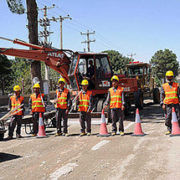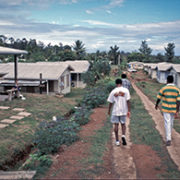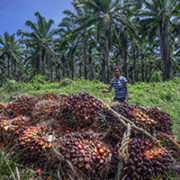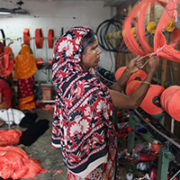Economics, Finance sector development, Governance and public sector management
 Finance sector development
Finance sector development
 Economics
Economics
 Industry and trade
Industry and trade
 Industry and trade, Infrastructure
Industry and trade, Infrastructure
 Urban development
Urban development
 Industry and trade
Industry and trade
 Industry and trade
Industry and trade
 Gender
Gender
 Economics, Education
Economics, Education

The brief for cash

Cash is an extremely useful social contrivance. Two possible drawbacks of high-denomination cash have recently been discussed by Kenneth Rogoff (2016) in his book, The Curse of Cash, and echoed by other economists. They are the extensive use of high-denomination cash by criminals and others engaged in illicit and corrupt activities, and the role that cash plays in avoiding deeply negative nominal interest rates imposed on bank accounts. Rogoff and others call for a phasing-out of high denomination cash over a long period.
One year after the Fed liftoff: Consequences for emerging markets

The Federal Open Market Committee, the official policy making body of the Board of Governors of the Federal Reserve System (Fed), announced the long-awaited increase, or liftoff, in the federal funds rate of 0.25% just over a year ago in December 2015. This action represented the beginning of a “return to normalcy” from the period since 2008 when the Federal Reserve had been operating at the zero lower bound. With the liftoff already 1 year behind us, market watchers widely expect continued, even abrupt, increases in United States (US) interest rates in the coming year.
Market failure or low-skills equilibrium?

As we know from countless growth accounting studies, the ability of a country to educate and train its citizens is a key determinant of economic development. There is also fairly strong evidence at the company level that a workforce with higher human capital generates higher productivity. In other words, not only are there strong incentives for governments to educate and train people, but there are also incentives at the firm level for companies to hire more educated workers and to offer training to their existing workers.
How trade can promote SDG goal 3: Duty-free market access for health products

Trade in health products has increased substantially over the past 2decades, and tariffs on health products have been lowered, making, for example, medicines more affordable for many.Indeed, Sustainable Development Goal (SDG) 3 calls upon countries to ensure healthy lives and to promote well-being for all ages. Yet in several developing countries, substantial tariffs still persist, inflating the prices of health products. The most direct and immediate contribution of the trade community toward achieving SDG 3 couldbe to open up trade unilaterally or to negotiate a plurilateral trade agreement, which would guarantee free market access for health products, like much-needed medicines.
Why poor countries should invest first in national trade infrastructure

Low-income countries are often advised to prioritize investment in their trade infrastructure to better connect to international markets, and garner the benefits of a more open trade regime. The World Bank’s Trade Facilitation Support Program and the World Trade Organization (WTO)’s Trade Facilitation Agreement, for example, promote investment in trade infrastructure to boost development prospects by improving competitiveness and lowering trade costs.
Housing policies under the New Urban Agenda

The biggest intergovernmental conference on housing and urbanization, Habitat III, took place in Quito, Ecuador, in October 2016. The main outcome of the conference was the adoption of the New Urban Agenda (NUA). The NUA does not consider urbanization as an obstacle to development but rather a key development driver. Providing adequate and affordable housing is one key theme in the NUA. It stresses the need to promote not only homeownership but also other types of tenure, such as cohousing.
The impact of trade on employment in the Sustainable Development Goals

Employment was an afterthought in the Millennium Development Goals (MDGs). It was not part of the original goals but was added in 2008, halfway through the implementation period. It is, however, a key element of the Sustainable Development Goals (SDGs). Goal 8 encourages countries to “promote sustained, inclusive and sustainable economic growth, full and productive employment and decent work for all.” There are eight employment-related targets and ten specific indicators (United Nations 2015).
Trading for sustainable fisheries

What fish trade policy options and recommendations can be put in place to help achieve the relevant Sustainable Development Goals (SDGs) of the United Nations? We need to understand the (i) relationship between fish trade and sustainable fisheries; (ii) potential promise of and the perils in the fish trade; and (iii) main trade-related concerns in the sustainability of fisheries. Sumaila (2017) addresses these issues in detail.
Inclusive development: can trade be good for women?

The United Nations Sustainable Development Goals (SDGs) highlight the need to achieve gender equality and to empower women and girls. Development that is truly inclusive clearly requires special attention to outcomes affecting more than half of the world’s population—yet historically, a group that has seen discrimination in law and fact over a long period.
Benefits of education and training for SMEs in Asia

The importance of small and medium-sized enterprises (SMEs) to economies in Asia is well known. They account for over 95% of all businesses, a third to half of aggregate output, and the majority of enterprise employment (Vandenberg, Chantapacdepong, and Yoshino 2016). We also know that SMEs do not have an easy life. They struggle to get established, face a higher failure rate than large firms, and lack access to key inputs such as finance. Finding ways to increase their survival rate and growth is important for expanding private sector activity in Asia’s developing economies. Sustaining enterprises requires that they are competitive; competitiveness, in turn, is based on productivity.


Search
Subscribe / Connect to Asia Pathways
Subjects
- Accelerating Progress in Gender Equality
- Addressing Remaining Poverty and Reducing Inequality
- Agriculture and natural resources
- Capacity development
- Climate change
- Economics
- Education
- Energy
- Environment
- Finance and Innovation
- Finance sector development
- Gender
- Globalization and Economic Stability
- Governance and public sector management
- Health
- Human Capital Development for Inclusive Growth and Shared Prosperity
- Industry and trade
- Information and Communications Technology
- Infrastructure
- Making Cities More Livable
- Miscellaneous
- Population
- Poverty
- Private sector development
- Regional cooperation and integration
- Sanitation
- Social development and protection
- Strengthening Governance and Institutional Capacity
- Subjects
- Transport
- Uncategorized
- Urban development
- Video Blog
- Water
Recent Posts
- The Promise and Perils of Mother Tongue-Based Education
- From Crisis to Resilience: The Evolution of the Banking Sector in Asia and the Pacific
- Tariffs on the Table: What Could Be Asia’s Next Move?
- Investing in Childcare a Win for Women and the Economy
- Flush and Flourish: Upgraded Toilets Can Transform Lives in Rural Asia




Recent Comments